Introduction
Hey there, rabbit lovers! Are you looking for the best way to keep your furry friends happy and healthy?
we’re diving into the wonderful world of alfalfa pellets and how they can benefit your beloved rabbits. As a long-time rabbit owner and enthusiast, I understand the importance of providing the right nutrition for our fluffy companions.
Now, you might be wondering, what exactly are alfalfa pellets? Well, they’re these little green nuggets packed with essential nutrients that rabbits love.
Alfalfa pellets have a whole range of benefits that can greatly improve your bunny’s health and well-being.
We’ll be exploring the high nutritional value of alfalfa pellets and how they provide rabbits with all the essential nutrients they need to thrive. From promoting healthy digestion to maintaining dental health and supporting proper weight management, alfalfa pellets have got it all covered.
Plus, we’ll discuss the importance of proper storage and handling to ensure the freshness and quality of the pellets.
So, if you’re ready to take your rabbit’s nutrition to the next level and provide them with the best possible care, join me as we uncover the benefits of feeding alfalfa pellets to rabbits. Your furry friends will thank you for it!
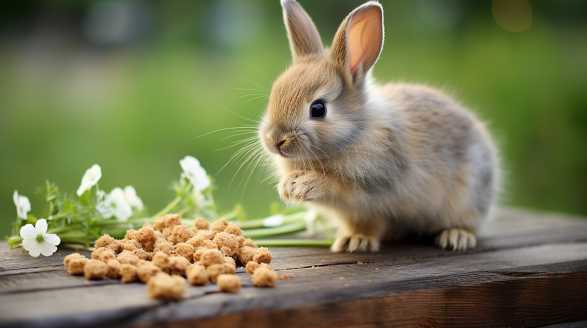
Key Takeaways
- Alfalfa pellets are nutrient-rich and provide essential vitamins, minerals, protein, and fiber for rabbits.
- They promote healthy digestion, dental health, and weight management in rabbits.
- For young rabbits, feed alfalfa pellets daily, but reduce their intake as they reach adulthood.
- Consider the rabbit’s weight and health conditions when determining the frequency of feeding alfalfa pellets.
- Introduce alfalfa pellets gradually and monitor water intake to prevent dehydration.
- Avoid overfeeding and provide a balanced diet consisting of hay, vegetables, and pellets.
- Alfalfa pellets can be beneficial for senior rabbits, but be cautious of excessive calcium intake and obesity risks.
- Store alfalfa pellets in a cool, dry place in airtight containers using the FIFO method.
- Proper handling and cleanliness are essential to avoid contamination.
- Alfalfa pellets should not replace hay entirely and should be used as a supplement to the rabbit’s diet.
- Consult with a veterinarian for personalized advice and adjust feeding accordingly for the rabbit’s specific needs.
The Benefits of Feeding Alfalfa Pellets to Rabbits
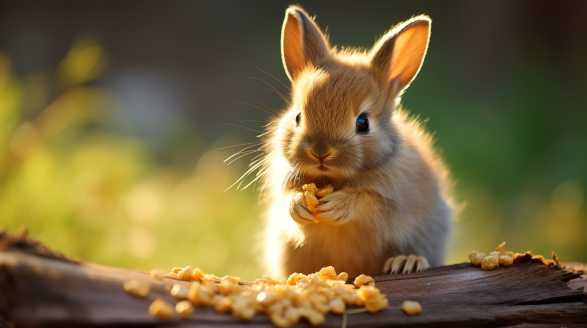
As a long-time rabbit owner, I have always been concerned about providing the best nutrition for my furry friends. Over the years, I have come across various types of rabbit food, but one that stands out in terms of its benefits is alfalfa pellets.
I will dive into the numerous benefits of feeding alfalfa pellets to rabbits.
What are Alfalfa Pellets?
Before we get into the benefits, let’s first understand what alfalfa pellets are. Alfalfa is a perennial, flowering plant that belongs to the legume family.
Alfalfa pellets are made by harvesting the plant, drying it, and grinding it into small pellets. These pellets provide a convenient way to incorporate this nutritious crop into a rabbit’s diet.
Benefit 1: High Nutritional Value
One of the primary reasons why alfalfa pellets are beneficial for rabbits is their high nutritional value. These pellets are loaded with essential nutrients, making them an excellent addition to their diet.
- Protein: Alfalfa pellets are rich in proteins, which are crucial for building and repairing tissues in rabbits’ bodies. Protein plays a vital role in maintaining healthy skin, strong muscles, and a well-functioning immune system.
- Vitamins: Alfalfa is known to contain various vitamins, including vitamin A, vitamin C, vitamin E, and several B vitamins. These vitamins support proper growth, aid in the functioning of the nervous system, and promote overall well-being.
- Minerals: Rabbits require a balanced intake of minerals for optimal health. Alfalfa pellets provide an abundant supply of minerals such as calcium, phosphorus, potassium, and magnesium, which are essential for maintaining strong bones, promoting proper digestion, and supporting muscle health.
Benefit 2: Dental Health
Rabbits have continuously growing teeth that need to be regularly worn down to prevent dental issues. Chewing on rough and fibrous food, like alfalfa pellets, helps wear down their teeth, reducing the risks of dental problems such as overgrown incisors or spurs.
Benefit 3: Digestive Health
A healthy digestive system is crucial for rabbits to maintain optimal well-being. Feeding alfalfa pellets can contribute to better digestive health in several ways:
- Fiber Content: Alfalfa pellets are an excellent source of dietary fiber, promoting good digestion and preventing constipation. Fiber helps maintain a healthy gut, prevents the formation of hairballs, and supports the overall well-being of your rabbit’s digestive system.
- Gut Motility: The high fiber content in alfalfa pellets helps regulate gut motility, ensuring a timely passage of food through the digestive tract. This can aid in proper digestion and prevent gastrointestinal issues.
- Hydration: Alfalfa pellets have a higher water content than dry hays, contributing to maintaining hydration levels in rabbits. Adequate hydration is vital for a healthy digestive system and overall well-being.
Benefit 4: Weight Management
Controlling a rabbit’s weight is essential to prevent obesity or malnourishment. Alfalfa pellets can be an effective tool in managing your rabbit’s weight:
- Portion Control: Alfalfa pellets can be conveniently measured and controlled to ensure your rabbit receives the appropriate amount of food. This helps avoid overfeeding, which can lead to obesity.
- Caloric Density: Alfalfa pellets are more calorie-dense than some other hays. If your rabbit needs to gain weight or has increased energy needs, alfalfa pellets can be a great option.
- Protein Boost: If your rabbit requires extra protein in their diet, such as during pregnancy or recovery from illness, alfalfa pellets provide a protein-packed addition to their regular food.
Benefit 5: Variety and Enrichment
Rabbits can easily become bored with a monotonous diet. Including alfalfa pellets in their daily meals can add variety and enrichment to their diet.
Feeding alfalfa pellets to rabbits brings numerous benefits, ensuring they receive a well-rounded and nutritious diet. From the high nutritional value to the positive impact on dental and digestive health, alfalfa pellets are certainly a worthy addition to any rabbit’s diet.
So, why not enrich your rabbit’s life by incorporating these beneficial alfalfa pellets into their daily meals? Your furry friend will thank you!
How Often Should You Feed Alfalfa Pellets to Your Rabbit?
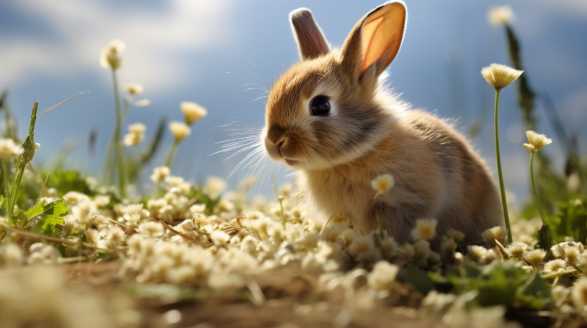
As a rabbit owner, one of the essential aspects to consider is their diet. Alfalfa pellets are a popular choice among rabbit owners due to their high nutritional value.
I’ll share my knowledge and experience on how often you should feed alfalfa pellets to your rabbit, along with some important considerations.
Understanding Alfalfa Pellets
Alfalfa pellets are made from the legume plant, alfalfa (Medicago sativa). This plant is highly nutritious and rich in protein, fiber, vitamins, and minerals, making it an excellent addition to a rabbit’s diet.
The Importance of a Balanced Diet
Rabbits require a balanced diet consisting of hay, fresh vegetables, water, and a small portion of pellets. The main component of a rabbit’s diet should be grass hay, such as timothy hay or orchard grass, which provides essential fiber for proper digestion.
Alfalfa Pellets as a Supplement
Alfalfa pellets are not intended to replace hay but should be seen as a supplement to a rabbit’s diet. They are typically recommended for specific life stages or health conditions, such as young rabbits, breeding rabbits, or rabbits with weight issues.
Factors to Consider When Feeding Alfalfa Pellets
Age
The age of your rabbit plays a significant role in determining the appropriate frequency of feeding alfalfa pellets. Young rabbits, up to seven months old, require a higher protein and calcium intake for proper growth and development.
However, once they reach adulthood, it’s advisable to transition to a diet consisting mainly of grass hay and limit alfalfa pellets to occasional treats.
Weight
The weight of your rabbit is another crucial factor to consider when determining the frequency of feeding alfalfa pellets. Overweight or obese rabbits should have their pellet intake reduced or eliminated altogether.
Health Conditions
Rabbits with certain health conditions can benefit from the nutritional boost provided by alfalfa pellets. For example, pregnant or nursing rabbits require additional nutrients to support the growth of their offspring.
In these cases, alfalfa pellets can be fed more frequently, but it’s important to consult with a veterinarian to ensure the appropriate amount.
Recommended Feeding Schedule
To provide a general guideline, here’s a recommended feeding schedule based on the factors discussed above:
- Young rabbits (up to seven months old): Offer a small portion of alfalfa pellets daily, along with unlimited access to grass hay and fresh vegetables.
- Adult rabbits (over seven months old): Transition to a primarily grass hay-based diet, offering a small portion of alfalfa pellets as an occasional treat, around two to three times per week.
- Breeding or pregnant rabbits: Increase the frequency of alfalfa pellets to provide the necessary nutrients for healthy offspring. Consult with a veterinarian for a specific feeding plan.
- Rabbits with health conditions: Follow the veterinarian’s recommendation regarding the frequency of feeding alfalfa pellets, as it may vary depending on the condition and dietary needs of the rabbit.
Monitoring Your Rabbit’s Health
While the recommended feeding schedule provides a general guideline, it’s essential to closely monitor your rabbit’s health and adjust their diet accordingly. Regularly check their weight, body condition, and overall energy levels.
Feeding alfalfa pellets to your rabbit can provide essential nutritional benefits, especially during specific life stages and health conditions. However, it’s important to strike a balance and not overfeed these pellets.
Remember to prioritize a diet consisting primarily of grass hay and fresh vegetables, and consult with a veterinarian for personalized advice.
Feeding Alfalfa Pellets to Baby Rabbits: Dos and Don’ts
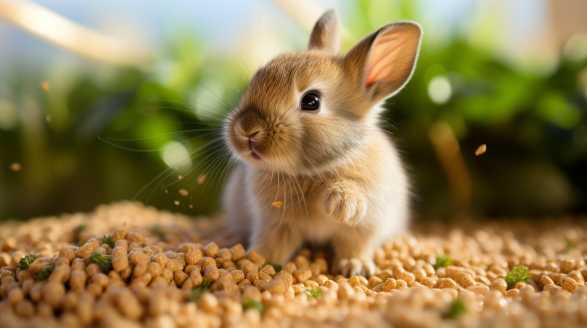
As a long-time rabbit owner and enthusiast, I understand the importance of providing the correct nutrition for my furry friends. One common question that often arises is whether baby rabbits can be fed alfalfa pellets.
Understanding the Nutritional Needs of Baby Rabbits
Before we dive into the specifics of alfalfa pellets, it is crucial to understand the nutritional requirements of baby rabbits. Unlike adult rabbits, baby rabbits have distinct dietary needs due to their rapid growth and development.
Baby rabbits require a diet high in protein, fiber, and calcium for their bones and muscles to grow strong. Their growing bodies demand a higher calorie intake than adult rabbits, making nutritional balance essential.
Alfalfa Pellets: An Optimal Choice for Baby Rabbits
Why Choose Alfalfa Pellets?
Rich in Protein and Calcium
When deciding on a suitable diet for baby rabbits, alfalfa pellets are often recommended. These pellets are made from the legume plant alfalfa, which is highly nutritious and packed with essential nutrients.
Alfalfa pellets contain a higher concentration of protein compared to timothy hay, which makes them an excellent choice for growing rabbits. Additionally, they offer an ideal source of calcium, necessary for the development of strong bones and teeth.
Dos of Feeding Alfalfa Pellets to Baby Rabbits
Now that we understand the benefits of alfalfa pellets let’s look into the dos of feeding them to baby rabbits.
1. Gradually Introduce Alfalfa Pellets
When introducing alfalfa pellets to baby rabbits, it is crucial to do so gradually. Start by mixing a small portion of pellets with their usual diet, such as hay or greens.
2. Monitor Water Intake
Ensure that your baby rabbits have access to fresh, clean water at all times. Alfalfa pellets are known to make rabbits more thirsty due to their higher protein content, so monitoring their water intake is vital.
3. Choose High-Quality Alfalfa Pellets
Opt for high-quality alfalfa pellets that are free from additives or other processed substances. Purchasing pellets from a reputable brand or a trusted supplier ensures that you are providing the best nutrition for your baby rabbits.
4. Adjust Portions According to Age and Growth
As your baby rabbits grow, their dietary requirements will change. Adjust the portion sizes of alfalfa pellets accordingly to match their age and growth stage.
5. Offer Variety with Other Foods
While alfalfa pellets provide a significant portion of a baby rabbit’s diet, it is essential to offer variety with other foods. Introduce fresh greens, vegetables, and hay to ensure a well-rounded nutritional intake.
Don’ts of Feeding Alfalfa Pellets to Baby Rabbits
To ensure the health and well-being of your baby rabbits, there are certain don’ts that should be observed when feeding alfalfa pellets.
1. Avoid Overfeeding
While alfalfa pellets are nutritious, overfeeding them can lead to health issues. Feeding baby rabbits excessive amounts of alfalfa pellets can result in obesity, digestive problems, and other complications.
2. Don’t Use Alfalfa Pellets as a Sole Diet
While alfalfa pellets are an essential component of a baby rabbit’s diet, they should not be the sole source of nutrition. Baby rabbits need a varied diet that includes hay, fresh greens, and vegetables to ensure optimal development and overall health.
3. Do Not Feed Adult Rabbits the Same Diet
Alfalfa pellets are primarily recommended for baby rabbits due to their higher protein and calorie needs. Adult rabbits have different nutritional requirements and should be fed a diet primarily consisting of timothy hay and limited alfalfa pellets.
Feeding baby rabbits alfalfa pellets can provide them with crucial nutrients during their rapid growth stage. By following the dos and don’ts outlined in this article, you can ensure a well-balanced diet for your furry little friends.
Remember, proper nutrition is the foundation for the healthy growth and development of your baby rabbits. Consult with a veterinarian specializing in rabbits for personalized advice tailored to your babies’ specific needs.
Alfalfa Pellets vs. Hay: Which is Better for Your Rabbit’s Health?
As a rabbit owner, I understand how perplexing it can be to choose between alfalfa pellets and hay for your furry friend’s health. After extensive research and consulting with veterinarians, I have gathered all the essential information you need to make an informed decision.
Rabbits are herbivores with a delicate digestive system, making proper nutrition vital for their health. Their primary diet consists of high-fiber foods, which aids in digestion and maintains dental health.
Alfalfa Pellets
Alfalfa pellets are made from dehydrated and compressed alfalfa, a legume rich in protein, calcium, and other essential nutrients. Here are the key points you need to know about alfalfa pellets:
Pros:
- High-nutritional content: Alfalfa pellets excel in providing essential vitamins and minerals necessary for rabbits.
- Ideal for younger rabbits: Due to their high calcium content, alfalfa pellets are particularly beneficial for growing rabbits, as it contributes to the development and maintenance of strong bones.
- Palatability: Many rabbits find the taste of alfalfa pellets quite appealing, which can make them easier to introduce into their diet.
Cons:
- High protein content: While protein is crucial for rabbits, excessive amounts can be harmful, especially for adult rabbits and those prone to weight gain.
- Unsuitable for overweight rabbits: Rabbits struggling with weight issues may need to restrict their intake of alfalfa pellets due to their high-calorie content.
- Dental concerns: Alfalfa pellets lack the necessary abrasiveness to properly wear down a rabbit’s constantly growing teeth, which can lead to dental issues if not supplemented with proper chewing materials.
Hay
Hay is a staple in a rabbit’s diet and provides the necessary fiber that aids in digestion and supports dental health. Here’s what you need to know about hay:
Pros:
- High fiber content: Hay is rich in fiber, which promotes healthy gut motility and prevents the occurrence of gastrointestinal issues like stasis.
- Dental health: Chewing tough hay strands helps naturally wear down a rabbit’s teeth, preventing dental problems such as overgrowth or spur formation.
- Weight management: Hay is a lower-calorie alternative to alfalfa pellets, making it suitable for rabbits prone to obesity or those on a weight management program.
Cons:
- Limited in nutritional value: While hay provides essential fiber, it lacks the same level of nutrients found in alfalfa pellets, which may lead to deficiencies if not supplemented with a balanced diet.
- Lower protein and calcium content: Older rabbits or those with specific health concerns that require higher levels of protein and calcium may need additional supplementation to meet their nutritional needs.
Which is Better for Your Rabbit’s Health?
Determining which option is better for your rabbit’s health depends largely on its age, overall health, and specific dietary requirements. Here’s a general guideline to help you make an informed decision:
- Young rabbits (up to six months): During the growth phase, alfalfa pellets are recommended due to their high calcium content, supporting the development of strong bones. However, be cautious not to overfeed, as excessive protein can lead to weight issues.
- Adult rabbits (six months and older): The primary diet for adult rabbits should consist of Timothy hay or other grass hays, supplemented with fresh vegetables and a limited quantity of pellets. This helps maintain a balanced diet, prevent weight gain, and support dental health.
- Rabbits with weight issues: Hay is preferable for overweight rabbits, as it has a lower calorie content and can assist in weight management. Limit the consumption of alfalfa pellets to avoid unnecessary weight gain.
- Rabbits with unique health needs: If your rabbit has specific health concerns that require additional calcium, protein, or other nutrients, consult with a veterinarian to determine the appropriate supplementation or diet adjustments.
Remember to introduce new foods gradually to prevent digestive upset and monitor your rabbit’s overall well-being when making any dietary changes. Always ensure access to fresh, clean water and observe your rabbit’s appetite, fecal output, and behavior for any signs of distress or discomfort.
Both alfalfa pellets and hay play vital roles in a rabbit’s diet, each having distinct advantages and considerations. While alfalfa pellets are beneficial for young rabbits, their high protein content may not be suitable for adult rabbits or those prone to weight gain.
By carefully considering your rabbit’s age, health, and nutritional needs, you can select the most appropriate option to ensure their overall well-being. Remember, a balanced and diverse diet, accompanied by regular veterinarian check-ups, will contribute to your rabbit’s happy and healthy life.
Common Mistakes to Avoid When Feeding Alfalfa Pellets to Rabbits
As a seasoned rabbit owner, I have learned a thing or two about the dos and don’ts of feeding alfalfa pellets to these adorable creatures. Alfalfa pellets make an excellent addition to a rabbit’s diet, but it’s important to be aware of the common mistakes that can easily be made when incorporating this food into their meal plan.
Why Feed Alfalfa Pellets to Rabbits?
Before diving into the common mistakes, let’s take a moment to understand why alfalfa pellets are beneficial for rabbits. Alfalfa is a nutrient-dense legume that offers a wide range of essential vitamins and minerals.
Additionally, alfalfa can be fed to rabbits as a treat or as a supplement to their regular diet, provided it is done correctly.
Mistake 1: Overfeeding
One of the most common mistakes rabbit owners make is overfeeding alfalfa pellets. While alfalfa is indeed nutritious, it should be given in moderation.
These pellets are higher in calories and protein compared to other types of hay, which are an essential part of a rabbit’s diet. An excessive amount of alfalfa can upset the balance of nutrients, potentially causing health issues such as gut stasis and bladder stones.
To avoid overfeeding, monitor your rabbit’s weight regularly and adjust the amount of alfalfa pellets accordingly. As a general guideline, adult rabbits should receive approximately one tablespoon of alfalfa pellets per 2 pounds of body weight each day.
Mistake 2: Ignoring the Fiber Content
Fiber is crucial for the proper functioning of a rabbit’s digestive system. It helps maintain healthy gut motility, prevents hairballs, and reduces the risk of various digestive disorders.
Therefore, relying solely on alfalfa pellets without providing enough hay can lead to digestive issues in rabbits.
To ensure a balanced diet, always provide unlimited access to high-quality grass hay alongside the alfalfa pellets. Timothy hay, orchard grass, or meadow hay are excellent choices to promote optimal digestion in rabbits.
Mistake 3: Neglecting Fresh Water
Water is an essential element of a rabbit’s diet. When consuming dry foods like alfalfa pellets, rabbits require an adequate amount of fresh water to keep their digestive system functioning smoothly.
Ensure your rabbits always have access to clean, fresh water. Consider using a water bottle or a heavy crock to prevent spillage.
Mistake 4: Serving as the Sole Diet
Some rabbit owners make the mistake of solely relying on alfalfa pellets as the primary source of nutrition for their rabbits. While alfalfa is highly nutritious, it should not replace a well-rounded diet.
Rabbits are herbivores, and their diet should consist primarily of high-quality hay, along with fresh vegetables and a small portion of pellets. A varied diet offers the necessary vitamins, minerals, and dietary fiber to keep rabbits healthy.
Mistake 5: Feeding to Inappropriate Age Groups
Not all rabbits have the same nutritional requirements. While alfalfa pellets are beneficial for specific age groups, they may not be suitable for others.
However, adult rabbits, especially those prone to bladder issues or obesity, should be transitioned to other types of hay with lower calcium levels. Alfalfa pellets should be reserved as a treat or only fed in moderation to adult rabbits.
Feeding alfalfa pellets to rabbits can be a wonderful way to supplement their diet and provide essential nutrients. However, it is essential to avoid the common mistakes discussed above to ensure the well-being of your furry companions.
Remember, a healthy rabbit is a happy rabbit!
Are Alfalfa Pellets Suitable for Senior Rabbits?
I have always been a passionate bunny lover, and over the years, I have come across a myriad of questions about rabbit care. One question that kept popping up was whether alfalfa pellets were suitable for senior rabbits.
I will share everything I have learned about alfalfa pellets for senior rabbits, including their benefits, potential drawbacks, and alternative options. So, let’s jump right in!
The Role of Diet in Senior Rabbit Care
As our furry friends grow older, their nutritional needs change, much like humans. Therefore, providing a well-balanced and appropriate diet becomes paramount for maintaining their health and vitality.
Understanding Alfalfa Pellets
Alfalfa pellets are a common type of rabbit feed made from the alfalfa plant. These pellets are widely available and often used as a primary food source for rabbits, mainly during their growth phases.
Benefits of Alfalfa Pellets for Senior Rabbits
While alfalfa pellets are mainly recommended for young rabbits, they can still offer some benefits to senior bunnies. Below, I’ve listed a few advantages of including alfalfa pellets in the diet of senior rabbits:
- Nutritional Support: Alfalfa pellets are rich in essential nutrients, including vitamins, minerals, and proteins, which can help meet the dietary requirements of senior rabbits.
- Easy to Chew: As rabbits age, they may experience dental issues, making it difficult for them to chew certain foods. Alfalfa pellets have a softer texture compared to other options, making them easier on the teeth of senior rabbits.
- Hay Replacement: Senior rabbits may develop a decreased appetite or struggle with digestion, which can affect their hay consumption. Introducing alfalfa pellets as a supplemental food source can ensure they still receive adequate nutrition.
Drawbacks of Alfalfa Pellets for Senior Rabbits
While alfalfa pellets can provide some benefits, there are also potential drawbacks to consider before incorporating them into a senior rabbit’s diet:
- Excess Calcium: Alfalfa pellets have high levels of calcium, which may not be suitable for senior rabbits prone to bladder stones or other urinary tract issues. It is essential to monitor the calcium intake to avoid exacerbating these conditions.
- Obesity Risk: Senior rabbits are more prone to weight gain due to a decrease in physical activity. Alfalfa pellets are higher in calories compared to other forage options, potentially increasing the risk of obesity if not consumed in moderation.
- Offering Limited Variety: Relying solely on alfalfa pellets limits the variety of foods provided to senior rabbits, which can hinder their nutrient intake and overall health.
Alternative Options for Senior Rabbit Diets
Considering the potential drawbacks of alfalfa pellets, exploring alternative food options for senior rabbits is essential. Here are some alternatives you can consider:
- Timothy Hay: Timothy hay is a staple food for rabbits of all ages. It is low in calcium and can help maintain proper digestion and dental health.
- Leafy Greens: Dark leafy greens such as kale, romaine lettuce, and parsley are excellent additions to a senior rabbit’s diet. They provide essential vitamins and minerals while being low in calories.
- Pellet Blends: Some commercially available rabbit feed blends are specifically formulated for senior rabbits, addressing their unique nutritional needs. Look for blends that have lower calcium and protein content.
After thorough research and consultations, I have found that while alfalfa pellets can have benefits for senior rabbits, they must be used with caution. The high calcium and calorie content can pose risks for certain health conditions, such as bladder stones and obesity.
As with any dietary changes, it’s best to consult with a veterinarian to ensure the specific needs of your senior rabbit are met. Every bunny is unique, and a customized diet plan can help promote their overall well-being and ensure a happy, healthy life for your beloved furry friend.
Can Rabbits Overdose on Alfalfa Pellets?
Being a rabbit owner, one of the most commonly asked questions I encounter is whether rabbits can overdose on alfalfa pellets. Alfalfa pellets are a popular dietary choice for rabbits due to their nutritional content, but it’s important to understand the potential risks associated with feeding too much alfalfa to our furry friends.
Understanding the Basics of Alfalfa Pellets
To comprehend the potential risks of alfalfa pellet overdose, it’s essential to first understand what alfalfa pellets are and why they are a popular choice among rabbit owners.
What Are Alfalfa Pellets?
Alfalfa pellets are a type of concentrated feed made from the legume plant known as alfalfa. These pellets are regularly included in rabbit diets due to their high nutritional value, including protein, calcium, and fiber.
Why Do Rabbit Owners Opt for Alfalfa Pellets?
Rabbits have specific dietary requirements, and alfalfa pellets fulfill many of these requirements. Alfalfa is an excellent source of protein, crucial for growth and development in young rabbits and pregnant does.
Now that we have a basic understanding of alfalfa pellets and why they are commonly fed to rabbits, let’s discuss the possibility of overdosing on them.
The Risks of Overfeeding Alfalfa Pellets to Rabbits
While alfalfa pellets offer numerous nutritional benefits, it’s crucial to avoid overfeeding them to rabbits. Overindulgence in alfalfa pellets can result in various health issues for your precious bunnies.
1. Obesity
Overconsumption of any food, including alfalfa pellets, can lead to obesity in rabbits. Rabbits have a sensitive digestive system, and their diet should consist of more fibrous foods.
2. Digestive Problems
Feeding too many alfalfa pellets to rabbits can disrupt their delicate gastrointestinal balance. Rabbits are designed to consume a high-fiber diet, predominantly consisting of hay.
Introducing excessive amounts of alfalfa pellets may cause diarrhea, gastrointestinal stasis, or other digestive issues.
3. Calcium Imbalance
As mentioned earlier, alfalfa pellets are rich in calcium, which is vital for proper bone development. However, too much calcium can also pose a problem.
Therefore, it’s crucial to strike a balance and monitor calcium intake carefully.
Maintaining a Balanced Diet
The key to providing a healthy diet for your rabbits is finding the right balance between hay, pellets, and fresh vegetables. Below are some guidelines regarding the ideal diet for rabbits:
Hay
Hay should make up the majority of a rabbit’s daily food intake. It provides essential roughage, aids in wearing down their constantly growing teeth, and maintains a healthy digestive system.
Pellets
Pellets should be given in limited quantities. Generally, providing 1/4 cup to 1/2 cup of pellets per day is sufficient for an average-sized adult rabbit.
Opt for timothy-based pellets rather than alfalfa-based ones, except for rabbits with specific nutritional needs.
Fresh Vegetables
Fresh vegetables should be an integral part of a rabbit’s diet. They provide essential vitamins and minerals while adding variety and hydration to their meals.
Include a variety of leafy greens such as romaine lettuce, spinach, and kale, along with occasional treats like carrots or bell peppers.
Now that we have explored the topic of whether rabbits can overdose on alfalfa pellets, it is clear that moderation is key. While alfalfa pellets have numerous nutritional benefits, overfeeding them to rabbits can result in obesity, digestive problems, and calcium imbalances.
Carefully monitor your rabbit’s diet, consult with a veterinarian if necessary, and ensure their diet remains balanced and suitable for their individual needs. Remember, a healthy rabbit is a happy rabbit!
A Beginner’s Guide to Feeding Alfalfa Pellets to Rabbits
When I first started feeding alfalfa pellets to my rabbits, I was uncertain about the process and had many questions. What are the benefits of feeding alfalfa pellets?
Are there any risks involved? In this beginner’s guide, I will share everything I have learned about feeding alfalfa pellets to rabbits.
What are Alfalfa Pellets?
Definition
Alfalfa pellets are small cylindrical pellets made from dehydrated alfalfa plants. They are highly nutritious and are often used as a supplemental feed for rabbits, among other animals.
Nutritional Value
Alfalfa pellets are rich in protein, fiber, and essential vitamins and minerals. They provide rabbits with the necessary nutrients for their growth and overall health.
Why Feed Alfalfa Pellets to Rabbits?
Boosts Protein Intake
Rabbits require a certain amount of protein in their diet for muscle development and maintenance. Alfalfa pellets have a high protein content, which helps meet this dietary need.
Good Source of Fiber
Fiber is crucial for maintaining a healthy digestive system in rabbits. Alfalfa pellets are an excellent source of dietary fiber, promoting proper gut function and preventing digestive issues.
Calcium and Other Minerals
Alfalfa pellets also contain a significant amount of calcium, along with other essential minerals like magnesium and potassium. These minerals support strong bones, teeth, and overall mineral balance in rabbits.
How to Feed Alfalfa Pellets to Your Rabbits
Introduce Gradually
When adding a new food to your rabbit’s diet, it’s essential to introduce it gradually to prevent digestive upsets. Start by offering a small amount of alfalfa pellets mixed with their regular food and gradually increase the portion over a week.
Daily Serving Size
The amount of alfalfa pellets you should feed your rabbits depends on their age, weight, and overall health. As a general rule, provide approximately one tablespoon of alfalfa pellets per pound of body weight per day.
Age Considerations
Young rabbits, particularly those under six months old, can benefit from a higher concentration of alfalfa pellets due to their higher protein needs for growth. However, adult rabbits should have limited alfalfa intake as it can be too rich for them.
Supplemental or Complete Feed
Alfalfa pellets can be used as a supplemental feed alongside your rabbit’s regular diet or as a complete feed. If using as a complete feed, make sure it is specially formulated for rabbits and provides all the necessary nutrients.
Water Availability
Always ensure your rabbits have access to fresh, clean water when feeding them alfalfa pellets. Water intake is essential for their overall health and aids in digestion.
Monitor Weight and Adjust
Regularly assess your rabbits’ weight to ensure they are not becoming overweight or underweight. Adjust the portion size of alfalfa pellets accordingly to maintain a healthy weight.
Frequently Asked Questions
Can alfalfa pellets be fed to all rabbit breeds?
Yes, alfalfa pellets are suitable for all rabbit breeds. However, it is essential to monitor the portion size and adjust feeding based on individual needs.
Can rabbits be allergic to alfalfa pellets?
While rare, some rabbits may develop allergies or sensitivities to alfalfa pellets. Monitor your rabbit for any signs of discomfort or allergic reactions, such as itching or digestive upset.
Can alfalfa pellets replace hay in a rabbit’s diet?
No, alfalfa pellets should not replace hay entirely. Hay is the primary source of fiber in a rabbit’s diet and helps maintain optimum dental health through constant chewing.
Can rabbits have too many alfalfa pellets?
Yes, excessive intake of alfalfa pellets can lead to weight gain and potential calcium imbalances in rabbits. Monitor portion sizes and consult with a veterinarian if you have concerns about your rabbit’s diet.
Feeding alfalfa pellets to rabbits can be a beneficial addition to their diet. Not only do they provide essential nutrients like protein and fiber, but they are also rich in calcium and other minerals.
Remember to consult with a veterinarian for personalized recommendations and enjoy seeing your rabbits thrive on this healthy feed option.
The Importance of Proper Storage and Handling of Alfalfa Pellets for Rabbits
As a rabbit owner, I understand the importance of providing my furry friends with a nutritious diet to ensure their optimal health and well-being. One key component of a rabbit’s diet is alfalfa pellets, which are rich in essential nutrients and high in fiber.
I will explore why it is crucial to store and handle alfalfa pellets correctly to maintain their quality and nutritional value for rabbits.
Storing Alfalfa Pellets
Importance of Proper Packaging
The first step in ensuring the quality of alfalfa pellets is to choose a reliable and airtight packaging. When purchasing alfalfa pellets, opt for bags that are specifically designed to keep the pellets fresh.
Dry and Cool Storage
Alfalfa pellets should be stored in a dry and cool environment to maintain their freshness and prevent spoilage. Moisture can lead to mold growth, which can be harmful to rabbits.
Consider investing in airtight containers or storage bins to keep the alfalfa pellets fresh. Place them in a cool, dry area away from direct sunlight, heat sources, and humidity.
Rotation and First-In-First-Out Method
To ensure that your rabbit consumes fresh alfalfa pellets, practice the rotation method. When you purchase a new bag of alfalfa pellets, make sure to use the oldest bag first.
By rotating the bags, you ensure that the older pellets are used before they lose their nutritional value. This way, you can be confident that your rabbits are consuming fresh and nutrient-rich alfalfa pellets.
Handling Alfalfa Pellets
Proper Handling Techniques
When handling alfalfa pellets, it is essential to maintain cleanliness and hygiene. Follow these proper handling techniques to ensure your rabbits’ health:
- Wash your hands thoroughly before handling the pellets to avoid transmitting any contaminants.
- Use a clean scoop or measuring cup to dispense the pellets. Avoid using dirty utensils that may introduce bacteria or pests into the pellets.
- Handle the pellets gently to prevent breakage and the formation of dust. Dust inhalation can be harmful to rabbits.
Avoiding Contamination
Contaminated alfalfa pellets can pose serious health risks to rabbits. The following steps can help you avoid contamination:
- Store alfalfa pellets away from chemicals, cleaning supplies, or any other substances that may contaminate them. These substances can cause health issues if ingested by rabbits.
- Keep the storage area clean and free of pests, such as rodents or insects. Ensure that the storage containers are tightly sealed to prevent infestation.
- Regularly inspect the pellets for signs of mold, discoloration, or unusual odor. If you notice any abnormalities, it is best to discard the affected pellets and replace them with a fresh batch.
Avoid Overfeeding
While alfalfa pellets are a crucial part of a rabbit’s diet, it is important not to overfeed them. Overfeeding can lead to obesity and other health problems.
Benefits of Proper Storage and Handling
By following the right storage and handling practices for alfalfa pellets, you can enjoy several benefits:
- Retained Nutritional Value: Proper storage helps maintain the nutritional value of alfalfa pellets, ensuring that your rabbits receive the essential nutrients they need for optimal health.
- Prolonged Shelf Life: Correct storage techniques prevent spoilage and extend the shelf life of alfalfa pellets, allowing you to use them for a more extended period and minimizing waste.
- Maintained Freshness: Fresh alfalfa pellets are more appealing to rabbits, encouraging them to consume their meals and promoting healthy eating habits.
- Health and Well-being: By avoiding contamination and proper handling, you minimize the risk of feeding your rabbits potentially harmful substances, reducing the likelihood of health issues.
Remember, proper storage and handling of alfalfa pellets for rabbits are vital in maintaining their quality and freshness. By investing in suitable packaging, ensuring dry and cool storage conditions, practicing the FIFO method, and following proper handling techniques, you can provide your rabbits with nutritious and delicious meals.
Prioritize the well-being of your rabbits by paying attention to the storage and handling of their food – it can make a world of difference in their overall health and happiness.
Conclusion
In conclusion, feeding alfalfa pellets to rabbits can greatly improve their overall health and well-being. These little green nuggets are packed with essential nutrients, including protein, fiber, vitamins, and minerals.
When feeding alfalfa pellets to rabbits, it’s important to consider their age, weight, and specific health conditions. Young rabbits can benefit from daily intake of alfalfa pellets, while adult rabbits should have limited amounts as part of a balanced diet.
Proper storage and handling of alfalfa pellets are also key. Storing the pellets in a cool, dry place in airtight containers using the FIFO method helps maintain their freshness and nutritional value.
While alfalfa pellets provide numerous benefits, they should not replace hay entirely. Hay remains the primary source of fiber in a rabbit’s diet and is essential for dental health and proper digestion.
In making decisions about feeding alfalfa pellets to rabbits, it’s always best to consult with a veterinarian. They can provide personalized advice based on the specific needs and health conditions of your rabbits.
So, if you’re looking for a way to enhance your rabbit’s diet and provide them with the best possible care, consider incorporating alfalfa pellets into their daily meals. Your furry friends will thank you for it.
Frequently Asked Questions
Can rabbits eat alfalfa pellets?
Yes, rabbits can eat alfalfa pellets. In fact, alfalfa pellets are a good source of essential nutrients for rabbits, such as protein and fiber.
How much alfalfa pellets should I feed my rabbit?
The amount of alfalfa pellets you should feed your rabbit depends on its age and size. As a general guideline, adult rabbits can be given about 1/8 to 1/4 cup of alfalfa pellets per day, while younger rabbits may require slightly more.
Can alfalfa pellets be the primary diet for rabbits?
While alfalfa pellets can be a part of a rabbit’s diet, it’s not recommended to be the sole or primary source of nutrition. Hay, fresh vegetables, and water should make up the majority of a rabbit’s diet.
Are there any risks associated with feeding rabbits alfalfa pellets?
Feeding rabbits alfalfa pellets in excessive amounts can lead to health issues such as obesity, gastrointestinal problems, or an unbalanced diet. It’s important to provide a balanced diet with a mix of hay, vegetables, and appropriate portions of alfalfa pellets.
Can I give alfalfa pellets to baby rabbits?
Yes, baby rabbits can have alfalfa pellets. They are actually recommended for young rabbits due to their higher protein and calcium content, which is essential for their growth.
Can I feed adult rabbits alfalfa pellets instead of hay?
Hay is a crucial component of a rabbit’s diet as it promotes healthy digestion and prevents dental issues. While alfalfa pellets can be given as a dietary supplement, they should not replace hay entirely.
Can alfalfa pellets be given to rabbits with special dietary needs?
Rabbits with specific dietary needs, such as those with obesity, kidney problems, or history of bladder issues, may require specialized diets. It’s always best to consult a veterinarian to determine the ideal diet for your rabbit’s specific condition. They will be able to advise whether it’s appropriate to include alfalfa pellets in their diet or suggest alternative options.
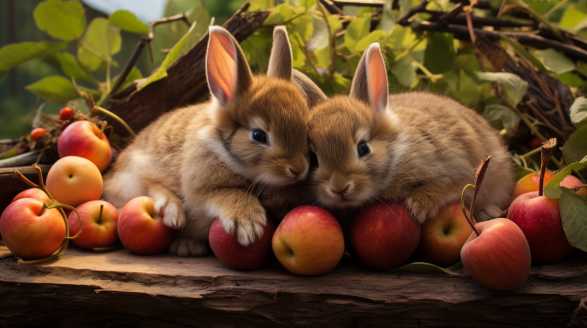
Can Rabbits Eat Nectarines
Introduction Can Rabbits eat nectarines? Let’s find out. Picture this: you’re sitting under the shade of a towering oak tree on a warm summer day, snacking on a ripe, succulent nectarine. The juice drips down your chin as you savor its sweet and tangy flavor. Well, get ready to hop down the rabbit hole because […]
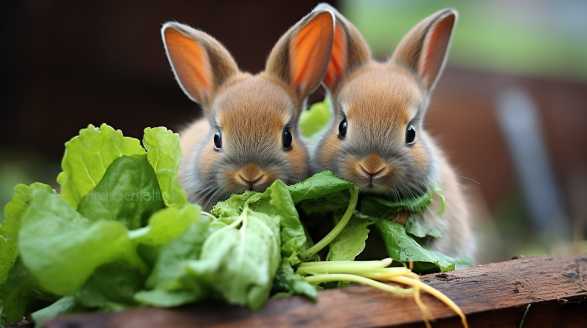
Can Rabbits Eat Swiss Chard
Introduction Can Rabbits eat Swiss chard? Let’s find out. Who would have thought that Swiss chard could be the secret ingredient to keeping our floppy-eared companions healthy and disease-free? Picture this: vibrant colors, crisp leaves, and a burst of nutrition that your rabbit will absolutely adore. Swiss chard is not just another pretty face in […]
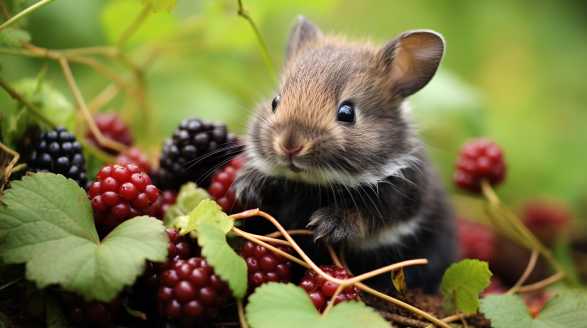
Can Rabbits Eat Blackberries
Introduction Hey there, fellow rabbit lovers! I’ve got something super exciting to share with you today. Well, get ready to hop into a berrylicious adventure because we’re about to dive into the world of blackberries for rabbits! Blackberries actually have a bunch of health benefits for our fluffy companions, and I can’t wait to spill […]
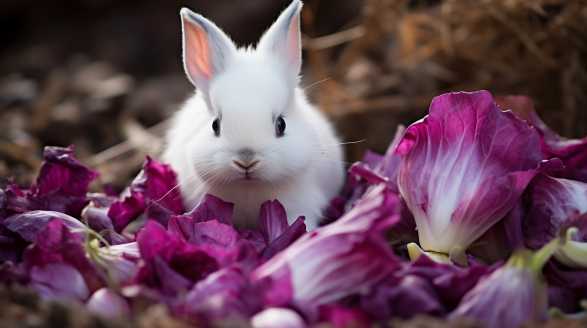
Can Rabbits Eat Radicchio
Introduction Hey there, fellow rabbit owners! Are you constantly wondering what foods are safe and nutritious for your furry little friends? It can be quite a challenge to navigate through the endless options available at the grocery store. One particular debate that has been on my mind lately is the battle of radicchio versus lettuce. […]
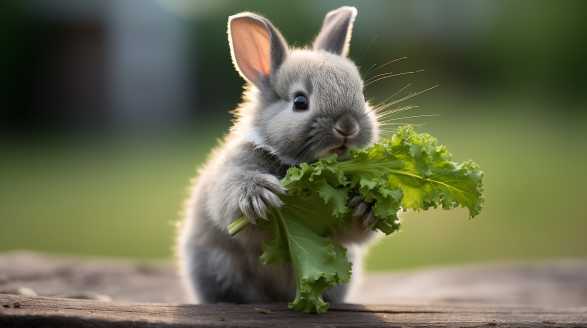
Can Rabbits Eat Kale
Introduction Can rabbits eat kale? Let’s find out. Now, picture this: fluffy bunnies bouncing around, their fur glistening in the sunlight, and their skin looking oh-so-smooth and radiant. Have you ever wondered what their secret is? Believe it or not, kale is not only a superfood for us humans, but it also packs a punch […]
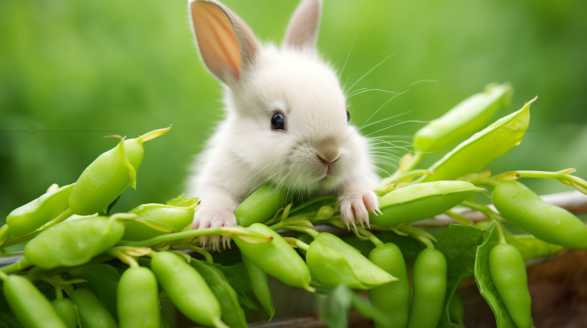
Can Rabbits Eat Snow Peas
Introduction Hey there fellow rabbit lovers! Are you curious about whether rabbits can develop allergies to snow peas? we’ll be delving deep into the topic of whether rabbits can have allergies to these tasty little pods. We’ll explore the possibilities, discuss the potential signs to look out for, and provide some alternative options if your […]
